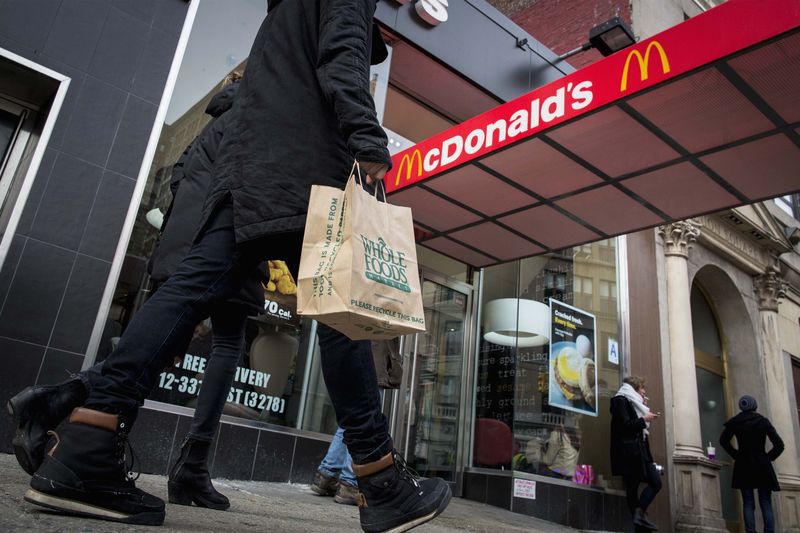By Neil Maidment
LONDON (Reuters) - A decade ago McDonald's (N:MCD) UK business needed better menus and a fresh image to catch up with consumer tastes. Now the U.S. firm, facing the same problems but on a much bigger scale, has turned to the man who fixed it for them last time.
Briton Steve Easterbrook, a 47-year-old company veteran, was appointed boss of the world's biggest burger chain last week, only the second non-American to take the job. His challenge is to halt a slide in sales around the world, caused by unpopular menus with too many options and accusations of poor quality.
The man from Watford, northwest of London, first made his mark in 2006 when he revived British sales by improving the brand's burgers, cutting the salt in its fries and introducing fresh, healthier food alongside organic milk and better coffee.
Easterbrook, who says he is partial to the company's quarter pounders with cheese, also opened up what had been seen as a closed corporate image, inviting consumers to visit its farms and blog about them and launching a website to answer food questions.
"It was something unheard of in the upper echelons of McDonald's at the time," said a former colleague, who did not wish to be named. "He was a breath of fresh air."
He even took on one of the chain's fiercest critics, "Fast Food Nation" author Eric Schlosser, and scored points in a live TV debate on food quality, such as healthier options, and better animal welfare standards.
Easterbrook's tenure sparked a rise in customer satisfaction data and UK sales, reinvigorating the company's British business that he has reminisced about visiting with school friends in the late seventies.
As Easterbrook readies to take the McDonald's helm on March 1 the company has already adopted some of his approaches more widely. Its 'Our Food, Your Questions' U.S. site has 20 million hits on YouTube, addressing queries from "Does McDonald's beef contain worms?" to "What's in the Big Mac sauce?"
Insiders hope this and other initiatives will remedy a collapse that has seen sales at established U.S. franchisees rise in only 12 of the last 30 months.
BETTER FOOD, BETTER TECH
After his UK success, Easterbrook led McDonald's European division. He was named global chief brand officer in 2013 following a short spell in charge of UK restaurant chains Pizza Express and Japanese food outlet Wagamama.
His knowledge of what works in which global markets is now core to the group's hopes of a turnaround and shares in McDonald's rose 3.2 percent on news of his appointment.
"For 59 years we asked customers to fit around our business model: Here's our menu and here's the way you can interact with us... But peoples' desires are changing," Easterbrook told a conference in December.
Those close to Easterbrook - a soccer fan who also played cricket at university with ex-England captain Nasser Hussain - speak of his straightforward and friendly management style. Ideas are encouraged and staff motivated to act fast, avoiding hierarchical structures and internal politics that have slowed the group down elsewhere.
Shareholders hope that approach should help him and his team engage swiftly with young consumers in the U.S., who currently prefer fast chains like Subway or more upscale rivals like Chipotle Mexican Grill (N:CMG) and Shake Shack
McDonald's, which serves 70 million customers a day worldwide, is also struggling to restore its reputation in Asia, where its Japanese business was hit last year after a major Chinese poultry supplier was found to have been in breach of food safety standards.
Under a turnaround plan launched by outgoing CEO Don Thompson, McDonald's U.S. menus will change to reflect local and regional interests and customization options such as adding mushrooms to your quarter pounder are being trailed, despite fears from restaurant operators that it could slow service.
The company is also improving its technology: self-service kiosks, mobile ordering and payments, and digital marketing are all in the works, the company has said.
McDonald's admits the problems it faces today in markets such as Australia, the U.S. and Germany are a repeat of the issues successfully fixed in Britain.
Larry Light, McDonald's global chief marketing officer from 2002 to 2005 and part of an earlier turnaround push, suggested a simple recipe for fixing what ails the firm.

"Fix the speed, fix the food," said Light. "Love the customer you have more than the one you don't."